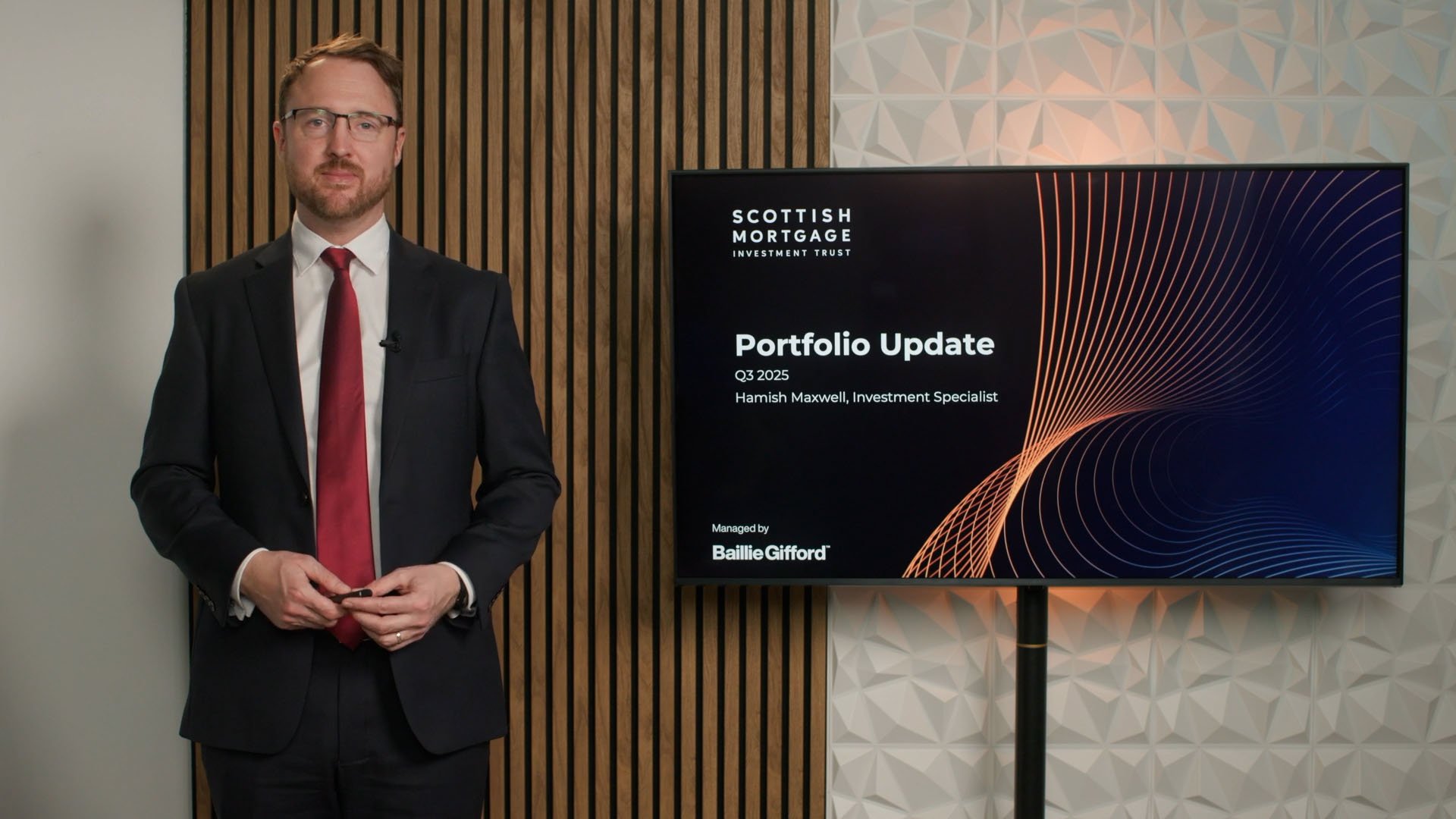Climeworks: digging deeper for climate solutions
Claire Shaw – Portfolio Director
Key Points
- Most climate change solutions focus on reducing future carbon emissions, but we need to also remove the carbon that’s already there
- Climeworks is currently the only company removing carbon dioxide from the air with direct air capture technology, and then storing it underground
- Co-founder Christoph Gebald tells us why he thinks by 2050, the carbon capture industry will be as big as the oil and gas industry is today

As with any investment, your capital is at risk.
We can’t beat climate change simply by reducing the carbon dioxide we produce. We must also strip vast amounts of existing CO₂ from the atmosphere.
Swiss company Climeworks is at the forefront of a new industry, carbon removal, enabled by ‘direct air capture’ (DAC) technology.
The process involves specialised sponge-like filters that capture and bind CO₂ molecules from the air, which are then heated to release the captured gas and finally stored deep underground.
In the latest episode of the Invest in Progress podcast, co-founder Dr Christoph Gebald shares his passion for carbon removal with Lawrence Burns, deputy manager of Scottish Mortgage.
Removing the final 10 per cent
Gebald notes there are two sides to achieving climate targets. While reducing our carbon emissions is “90 per cent of the journey,” Climeworks is focused on the final 10 per cent – removing carbon from the atmosphere to counteract unavoidable emissions.
Currently, only two options are available – planting trees or, as Climeworks does, removing CO₂ from the air and storing it underground.

Listen to the latest Invest in Progress podcast episode to learn more about Climeworks’ journey to inspire one billion people to remove CO2 from the air.
Listen to the podcast here.
Climeworks is the first company to deliver a commercial solution. Gebald explains that although there are many parties talking about doing carbon removal, “we for the moment are the only ones delivering and actually verified by a third party.”
“The total volumes that must be taken out of the air with a technology like ours are estimated to be 5 to 15 billion tons [annually] by 2050.”
That means a steep learning curve.
Climeworks’ DAC facility in Iceland, Orca, which started operating in 2021, currently removes a couple of tons of emissions per year, equivalent to “the unavoidable emissions of roughly 10,000 electric cars”.
Mammoth, the company’s next Icelandic facility due to start operating this year, will scale that by ten times – a capacity of 30,000 to 40,000 tons.
From there, Climeworks is targeting multi-million-ton carbon removal by 2030. The US Department of Energy is on board. It recently announced $600m in support to build a further ten-times-scaled facility in the US.
By 2050, the company aims to achieve an overall capacity of a billion tons of carbon annually.
Gebald thinks it’s achievable, “That is exactly the amount of scaling that, for example, the renewable industry, both solar and wind, did between 2000 and 2020.”
By 2030, he hopes Climeworks can be on par with where solar capacity was in 2000 so that “To our kids and grandkids, the image of an air capture plant will be as normal as today a wind farm or a solar farm is to us.”
Gebald believes that with the right policy incentives and supply chains in place by 2030, Climeworks could then scale its DAC technology “by 1,000 times over the next 20-year timeframe”.
Oil and gas in reverse
While the cost is currently $800-$900 per ton to remove CO₂ from the atmosphere, Gebald believes that a realistic long-term estimate is $200-$300 per ton.
If you multiply that price by the predicted need to remove 5 to 15 billion tons of carbon annually by 2050, “you end up with a trillion-dollar market”.
“Essentially, 30 years down the road, this market will be as big as oil and gas is today.”
“If you look at how the oil and gas industry is set up today, it’s 10-20 huge companies acting in this market. I expect that in 2050, we’ll have the same number [of carbon removal companies] operating on a global scale, having hundreds of billions of revenue.”
“It’s impossible that a single company will be able to deal with [15 billion tons each year],” admits Gebald. So, he welcomes others to the industry.
But Climeworks’ head start means it has been refining its technology and gathering valuable data to improve its processes before others have deployed workable solutions.
“What’s important is our ambition to lead the pack,” says Gebald. “Leadership defined by the money raised, the people employed, the agreements closed. This is where Climeworks is in the pole position.”
Climeworks’ founders, Dr Christoph Gebald and Dr Jan Wurzbacher, met in 2003 as mechanical engineering students at ETH Zurich. From the outset, they shared a passion for improving the world through entrepreneurship.
In 2007, they began to “scout very proactively for topics with the potential to be commercially deployed.” Having researched direct air capture and optimised the technology, they were “so fascinated by the results” that they founded Climeworks in 2009, “right after handing in our thesis”.
Making a difference
Scottish Mortgage holds a 0.35 per cent stake in Climeworks which, as deputy manager Lawrence Burns highlights, is “at the much smaller end of everything we do” – both in terms of holding size and the growth stage of the company.
Burns explains that to consider such an investment, “the opportunity set has to be really large so that … it can make a big difference, potentially, for clients.”
“We’re very open that there’s a wide range of outcomes with some of these earlier stage investments, but … if they work, we’ll happily devote more capital to them and grow them and own them for the next 10 years.”
In the meantime, Burns is excited to participate in Climeworks’ “journey of creating a new industry” for a more sustainable future.
About the author - Claire Shaw
Portfolio Director
Claire Shaw is a portfolio director and plays a prominent role in servicing Scottish Mortgage’s UK shareholder base. Before joining in 2019, she spent over a decade as a fund manager with a focus on managing European equity portfolios for a global client base. With a background in analysing companies and communicating investment ideas, Claire is also responsible for creating engaging content that makes the Scottish Mortgage portfolio accessible to all its shareholders. Beyond that, she works closely with the managers, meeting with portfolio companies and conducting in-depth portfolio discussions with shareholders.
Regulatory Information
This content was produced and approved at the time stated and may not have been updated subsequently. It represents views held at the time of production and may not reflect current thinking. Read our Legal and regulatory information for further details.
A Key Information Document is available by visiting our Documents page. Any images used in this content are for illustrative purposes only.
This content does not constitute, and is not subject to the protections afforded to, independent research. Baillie Gifford and its staff may have dealt in the investments concerned. The views expressed are not statements of fact and should not be considered as advice or a recommendation to buy, sell or hold a particular investment.
Baillie Gifford & Co and Baillie Gifford & Co Limited are authorised and regulated by the Financial Conduct Authority (FCA). The investment trusts managed by Baillie Gifford & Co Limited are listed on the London Stock Exchange and are not authorised or regulated by the FCA.
Baillie Gifford Asia (Hong Kong) Limited 柏基亞洲(香港)有限公司 (BGA) holds a Type 1 licence from the Securities and Futures Commission of Hong Kong to market and distribute Baillie Gifford’s range of collective investment schemes and closed-ended funds such as investment trusts to professional investors in Hong Kong.
Baillie Gifford Asia (Singapore) Private Limited (BGAS) is regulated by the Monetary Authority of Singapore as a holder of a capital markets services licence to conduct fund management activities for institutional investors and accredited investors in Singapore. BGA and BGAS are wholly owned subsidiaries of Baillie Gifford Overseas Limited, which is wholly owned by Baillie Gifford & Co.
Europe
Scottish Mortgage Investment Trust PLC (the “Company”) is an alternative investment fund for the purpose of Directive 2011/61/EU (the “AIFM Directive”). Baillie Gifford & Co Limited is the alternative investment fund manager (“AIFM”) of the Company and has been authorised for marketing to Professional Investors in this jurisdiction.
This content is made available by Baillie Gifford Investment Management (Europe) Limited (“BGE”), which has been engaged by the AIFM to carry out promotional activities relating to the Company. BGE is authorised by the Central Bank of Ireland as an AIFM under the AIFM Regulations and as a UCITS management company under the UCITS Regulation. BGE also has regulatory permissions to perform promotional, advisory and Individual Portfolio Management activities. BGE has passported its authorisations under the mechanisms set out in the AIFM Directive.
Belgium
The Company has not been and will not be registered with the Belgian Financial Services and Markets Authority (Autoriteit voor Financiële Diensten en Markten / Autorité des services et marchés financiers) (the FSMA) as a public foreign alternative collective investment scheme under Article 259 of the Belgian Law of 19 April 2014 on alternative collective investment institutions and their managers (the Law of 19 April 2014). The shares in the Company will be marketed in Belgium to professional investors within the meaning the Law of 19 April 2014 only. Any offering material relating to the offering has not been, and will not be, approved by the FSMA pursuant to the Belgian laws and regulations applicable to the public offering of securities. Accordingly, this offering as well as any documents and materials relating to the offering may not be advertised, offered or distributed in any other way, directly or indirectly, to any other person located and/or resident in Belgium other than to professional investors within the meaning the Law of 19 April 2014 and in circumstances which do not constitute an offer to the public pursuant to the Law of 19 April 2014. The shares offered by the Company shall not, whether directly or indirectly, be marketed, offered, sold, transferred or delivered in Belgium to any individual or legal entity other than to professional investors within the meaning the Law of 19 April 2014 or than to investors having a minimum investment of at least EUR 250,000 per investor.
Germany
The Trust has not offered or placed and will not offer or place or sell, directly or indirectly, units/shares to retail investors or semi-professional investors in Germany, i.e. investors which do not qualify as professional investors as defined in sec. 1 (19) no. 32 German Investment Code (Kapitalanlagegesetzbuch – KAGB) and has not distributed and will not distribute or cause to be distributed to such retail or semi-professional investor in Germany, this document or any other offering material relating to the units/shares of the Trust and that such offers, placements, sales and distributions have been and will be made in Germany only to professional investors within the meaning of sec. 1 (19) no. 32 German Investment Code (Kapitalanlagegesetzbuch – KAGB).
Luxembourg
Units/shares/interests of the Trust may only be offered or sold in the Grand Duchy of Luxembourg (Luxembourg) to professional investors within the meaning of Luxembourg act by the act of 12 July 2013 on alternative investment fund managers (the AIFM Act). This document does not constitute an offer, an invitation or a solicitation for any investment or subscription for the units/shares/interests of the Trust by retail investors in Luxembourg. Any person who is in possession of this document is hereby notified that no action has or will be taken that would allow a direct or indirect offering or placement of the units/shares/interests of the Trust to retail investors in Luxembourg.
Switzerland
The Trust has not been approved by the Swiss Financial Market Supervisory Authority (“FINMA”) for offering to non-qualified investors pursuant to Art. 120 para. 1 of the Swiss Federal Act on Collective Investment Schemes of 23 June 2006, as amended (“CISA”). Accordingly, the interests in the Trust may only be offered or advertised, and this document may only be made available, in Switzerland to qualified investors within the meaning of CISA. Investors in the Trust do not benefit from the specific investor protection provided by CISA and the supervision by the FINMA in connection with the approval for offering.
Singapore
This content has not been registered as a prospectus with the Monetary Authority of Singapore. Accordingly, this content and any other content or material in connection with the offer or sale, or invitation for subscription or purchase, of the Trust may not be circulated or distributed, nor may be offered or sold, or be made the subject of an invitation for subscription or purchase, whether directly or indirectly, to persons in Singapore other than (i) to an institutional investor (as defined in Section 4A of the Securities and Futures Act 2001, as modified or amended from time to time (SFA)) pursuant to Section 274 of the SFA, (ii) to a relevant person (as defined in Section 275(2) of the SFA) pursuant to Section 275(1), or any person pursuant to Section 275(1A), and in accordance with the conditions specified in Section 275 of the SFA, or (iii) otherwise pursuant to, and in accordance with the conditions of, any other applicable provision of the SFA.
Where the Trust is subscribed or purchased under Section 275 by a relevant person which is:
(a) a corporation (which is not an accredited investor (as defined in Section 4A of the SFA)) the sole business of which is to hold investments and the entire share capital of which is owned by one or more individuals, each of whom is an accredited investor; or
(b) a trust (where the trustee is not an accredited investor) whose sole purpose is to hold investments and each beneficiary of the trust is an individual who is an accredited investor, securities or securities-based derivatives contracts (each term as defined in Section 2(1) of the SFA) of that corporation or the beneficiaries’ rights and interest (howsoever described) in that trust shall not be transferred within six months after that corporation or that trust has acquired the securities pursuant to an offer made under Section 275 except:
(1) to an institutional investor or to a relevant person or to any person arising from an offer referred to in Section 275(1A) or Section 276(4)(c)(ii) of the SFA,
(2) where no consideration is or will be given for the transfer;
(3) where the transfer is by operation of law; or
(4) pursuant to Section 276(7) of the SFA or Regulation 37A of the Securities and Futures (Offers of Investments) (Securities and Securities-based Derivatives Contracts) Regulations 2018.





